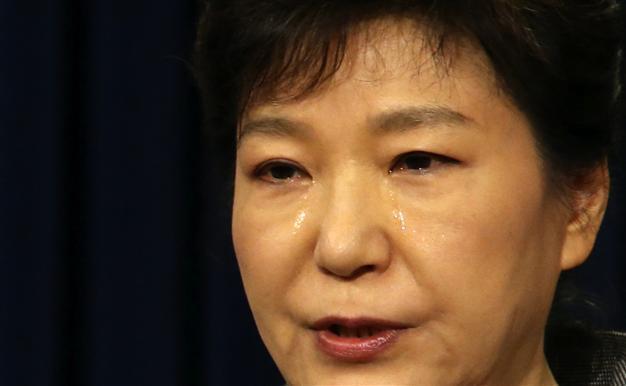Tearful South Korean president says responsibility 'lies with me' for mishandling ferry disaster
SEOUL - Agence France-Presse

South Korean President Park Geun-hye weeps while delivering a speech to the nation about the sunken ferry Sewol at the presidential Blue House in Seoul, May 19. AP Photo
South Korean President Park Geun-Hye took tearful responsibility May 19 for the mishandling of last month's Sewol ferry disaster, admitting many lives were unnecessarily lost and vowing to dismantle the national coastguard.
"The ultimate responsibility for the poor response to this accident lies with me," Park said in a televised address to the nation, during which she openly wept and twice bowed deeply in a display of contrition.
Park's popularity ratings have been hammered by the April 16 disaster that claimed around 300 lives, most of them schoolchildren.
She has voiced regret several times, but Monday's address was the first time she has explicitly accepted direct responsibility for what has become a defining moment of her presidency.
"As the president responsible for the lives and safety of South Koreans, I offer my sincere apology for all the suffering," she said.
Prime Minister Chung Hong-Won resigned last month over the disaster, and while there have been few calls for Park to step down, she has been criticised for not displaying enough sympathy or remorse.
Towards the end of her 30-minute address, Park's voice choked with emotion and tears ran down her face as she described the heroic actions of some of the victims who died trying to save others.
She highlighted the failure of the coastguard's immediate response to the tragedy and acknowledged the complaints of the victims' relatives that many more lives might have been saved.
"I have decided to dismantle the coastguard," she said, adding that its roles would be split between the police and a newly created ministry of national safety.
The 6,825-tonne Sewol was carrying 476 people when it capsized and sank off the southern coast on April 16. The confirmed death toll stands at 286, with 18 still unaccounted for.
Of those on board, 325 were children from a high school on an organised trip to the southern resort island of Jeju.
The victims' families have been extremely critical of nearly every aspect of the government's handling of the disaster, with some taking their protests to the doors of the presidential Blue House in Seoul. Many relatives believe some children may have survived for hours or even days inside air pockets in the capsized ferry, but died because rescuers took too long to access the submerged vessel.
'Act of murder'Most of the ferry crew members escaped the vessel before it sank, and they have been vilified for abandoning hundreds of trapped passengers. The Sewol's captain and three crew members were charged last week with manslaughter arising from gross negligence.
"The irresponsible acts of the captain and crew members who abandoned hundreds of people are practically an act of murder," Park said, adding that existing legislation would be amended to provide harsher penalties for officials found responsible for such accidents.
The Sewol tragedy has triggered a bout of intense national soul-searching in a country that had, until now, taken enormous pride in its extraordinarily rapid transformation from a war-torn, impoverished backwater to Asia's fourth-largest economy.
Investigations into the disaster have suggested it was almost wholly man-made: the result of cut corners, regulatory violations, poor safety training and a woeful lack of oversight - all, or nearly all, attributable to a desire to maximise profits.
"It is our duty to reform and transform the country so that these lives were not lost for nothing," Park said, pledging to address the corrupt culture of collusion between regulators and business.
That cozy, illicit relationship was to blame, initial investigations suggest, for the fact that the Sewol was carrying three times its cargo capacity when it capsized.
Park also suggested that the time had come to break out of a period of mourning and recrimination that has paralysed the country for the past month.
"Now is the time to leave frustration behind and move forward. We have to set the country upright and transform it. "I will stake my political life on correcting the wrong practices that have plagued our country for so long," she said.
South Korea is to hold key local elections in several weeks and Park's ruling Saenuri party is concerned about the political fallout of the ferry disaster. Yang Seung-Ham, a professor of political science at Yonsei University, said Park's emotional address had sought to appease public opinion and draw a line in the blame game. "Presidents should control their emotions, but I think it was a necessary gesture to show that she shared the public's sense of loss and sorrow," Yang said.
